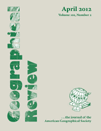
GEOGRAPHICAL REVIEW
Scope & Guideline
Charting New Territories in Earth-Surface Studies
Introduction
Aims and Scopes
- Urban Geography and Planning:
The journal frequently publishes studies on urban expansion, land use patterns, and the socio-economic dynamics of urban areas, particularly in African cities. - Environmental Sustainability and Climate Change:
A significant focus is placed on understanding the impacts of climate change, land cover dynamics, and sustainable practices in various ecological contexts throughout Africa. - Socio-Economic Development and Poverty Alleviation:
Research exploring the intersection of geography with socio-economic issues such as poverty, food security, and community resilience is prevalent, emphasizing local perspectives and solutions. - Geospatial Analysis and Technology:
The utilization of geospatial technologies such as GIS and remote sensing is a core methodology applied in many studies, facilitating detailed spatial analysis of various phenomena. - Cultural and Gender Studies in Geography:
The journal also addresses cultural dynamics, gender issues, and the role of local knowledge systems in environmental management and community development.
Trending and Emerging
- Sustainable Energy and Resource Management:
There is an increasing focus on studies related to sustainable energy practices, particularly in urban contexts and low-income settings, as researchers explore solutions to energy transitions and resource management. - Urban Resilience and Community Adaptation:
Research highlighting community-led initiatives and resilience strategies in response to urban challenges, including climate change and socio-economic pressures, is gaining traction. - Informality and Urban Development:
The exploration of informal settlements and economies is trending, as researchers investigate their roles in urban development and the implications for planning and policy. - Health Geography and Pandemic Responses:
The impact of health crises, especially COVID-19, on urban households and food security is an emerging theme, reflecting the intersection of geography, health, and socio-economic factors. - Geospatial Technology Applications:
The application of advanced geospatial technologies, such as machine learning and remote sensing, in analyzing urban dynamics and environmental changes is on the rise, showcasing innovative methodologies in geographical research.
Declining or Waning
- Traditional Agricultural Studies:
Research focusing exclusively on conventional agricultural practices has seen a decline, as there is a growing emphasis on sustainable and modern agricultural techniques that integrate technological advancements. - Static Environmental Assessments:
Papers that provide static, one-time assessments of environmental conditions without considering dynamic changes or longitudinal studies are becoming less frequent, highlighting a shift toward more dynamic and ongoing analyses. - Historical Geography:
While historical perspectives are still relevant, the number of papers solely focused on historical geography has waned, as contemporary issues and their immediate impacts take precedence in current research. - Generalized Urban Studies:
Studies that lack a specific focus on localized urban issues and do not incorporate socio-economic or environmental dimensions have decreased, reflecting a trend towards more nuanced, context-specific urban analyses.
Similar Journals
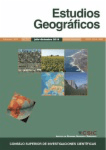
Estudios Geograficos
Empowering Scholars with Cutting-Edge Geographic ResearchEstudios Geograficos, a prominent journal published by the CONSEJO SUPERIOR INVESTIGACIONES CIENTIFICAS-CSIC in Spain, serves as a vital platform for advancing the fields of geography and earth-surface processes. With an ISSN of 0014-1496 and E-ISSN of 1988-8546, the journal has been committed to Open Access since 1996, ensuring that its valuable research is accessible to a global audience. Recognized as a Q3 journal in both Earth-Surface Processes and Geography, Planning and Development, it plays a crucial role in shaping understanding and policy related to our planet. As of 2023, it holds a respectable rank of 562nd in Social Sciences Geography and maintains a percentile standing, reflecting its significance within the academic community. Covering a diverse range of topics, Estudios Geograficos aims to foster scholarly dialogue and disseminate innovative interdisciplinary findings, providing researchers, professionals, and students with critical insights and tools to address contemporary geographic challenges.

Revista Geografica de America Central
Advancing Knowledge in Central American Geography.Revista Geografica de America Central is a distinguished scholarly journal published by the UNIV NACL, ESCUELA CIENCIAS GEOGRAFICAS, focusing on the dynamic field of geography, particularly within Central America. Since its inception in 1974, the journal has championed the dissemination of open-access research, fostering collaboration and innovation among researchers, professionals, and students alike. With an evolving scope that reflects the region's rich geographical diversity, this journal serves as a vital platform for sharing empirical studies, theoretical advancements, and methodological discussions that enhance our understanding of Central America's unique environmental and socio-economic challenges. Although it has experienced various coverage periods, the journal remains committed to advancing geographic scholarship and supporting open academic discourse. Its open-access model ensures that essential knowledge is readily available to an expanding global audience, making it an invaluable resource in the field.

Chinese Geographical Science
Connecting Scholars to Shape Tomorrow's Geographical Policies.Chinese Geographical Science is a prestigious, peer-reviewed journal published by Springer, dedicated to the dynamic and interdisciplinary fields of Earth and Planetary Sciences and Geography, Planning and Development. With an impressive 2023 Q1 ranking in both categories, the journal supports the dissemination of groundbreaking research from a global perspective, reflecting its significance in the scientific community. The journal is indexed under the highly regarded Scopus database, where it ranks in the top percentile in both Geography and Earth Sciences, illustrating its commitment to excellence and impact within these disciplines. Since its inception in 1991, it has provided a vital platform for researchers and scholars to share their findings, address pressing geographical issues, and contribute to the development of innovative solutions for sustainable development. Although it operates under a subscription model, its rigorous peer-review process ensures that the highest quality of research is published. By fostering collaboration and dialogue among scholars, Chinese Geographical Science plays an essential role in advancing knowledge and shaping policy in geographical sciences and beyond.
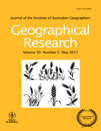
Geographical Research
Advancing Insights in Geography and PlanningGeographical Research, published by WILEY, is a premier academic journal based in the United Kingdom, dedicated to advancing knowledge in the fields of Geography, Planning, and Earth-Surface Processes. With an impact factor that reflects its high academic caliber, this journal ranks in the Q2 category for Earth-Surface Processes and Q1 in Geography, Planning and Development, highlighting its influential role in shaping contemporary research within these disciplines. The journal's Scopus rankings further underscore its significance, standing at #175 out of 821 in Geography, and #41 out of 179 in Earth-Surface Processes, placing it within the top 78th and 77th percentiles, respectively. Since its inception in 2005, Geographical Research has continuously provided a vital platform for scholars to disseminate innovative research, fostering dialogue and collaboration across disciplines. Although currently not open access, its content remains indispensable for researchers, professionals, and students aiming to deepen their understanding of geographical phenomena and develop strategic insights for planning and development.

Revista Acta Geografica
Mapping the Future of Geographic ScienceRevista Acta Geografica is a prestigious academic journal published by the Universidade Federal de Roraima, specializing in the dynamic field of geography. With the ISSN 1980-5772 and E-ISSN 2177-4307, this journal provides a platform for interdisciplinary research that addresses geographical phenomena, spatial analysis, and environmental concerns primarily relevant to the Brazilian context but also extending to global studies. As an open-access journal, it aims to foster knowledge distribution among researchers, professionals, and students without financial barriers, promoting wider dissemination of scientific outcomes. The journal continues to play a critical role in advancing geographical scholarship, emphasizing both theoretical frameworks and applied methodologies. With a commitment to quality and innovation, Revista Acta Geografica is an essential resource for anyone invested in geographical research and practice.
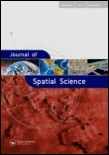
Journal of Spatial Science
Transforming Understanding of Our Spatial WorldThe Journal of Spatial Science, published by Taylor & Francis Ltd, serves as a prominent platform for the dissemination of research in the interdisciplinary fields of geography, atmospheric science, and energy. With an ISSN of 1449-8596 and an E-ISSN of 1836-5655, this journal has established itself as a vital resource since its inception in 2004, boasting an impressive convergence period extending to 2024. Recognized in the Q3 quartile for Atmospheric Science and Energy (miscellaneous), and achieving a Q2 classification in Geography, Planning and Development in 2023, the journal not only reflects the evolving complexities of spatial science but also underscores its increasing relevance in addressing contemporary global challenges. The journal holds a commendable position in Scopus rankings, with notable placements in various categories, further highlighting its academic significance. Researchers, professionals, and students are encouraged to engage with the rich content offered, as the Journal of Spatial Science remains committed to advancing knowledge and fostering discussions pertinent to spatial analysis and its applications.
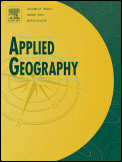
APPLIED GEOGRAPHY
Transforming data into impactful geographical solutions.APPLIED GEOGRAPHY, published by Elsevier Science Ltd, stands as a premier journal within the fields of environmental science, geography, planning and development, as well as tourism, leisure, and hospitality management. With an impressive 2023 impact factor that reflects its high citation rates, this journal is ranked Q1 in several categories, underscoring its significance and influence in interdisciplinary research. Covering a broad range of topics from innovative environmental practices to spatial analysis and socio-economic factors affecting tourism, APPLIED GEOGRAPHY promotes insightful discussions and practical applications that are vital for advancing knowledge and practice in these fields. Researchers, professionals, and students will find the journal's rigorous peer-reviewed articles invaluable for staying informed about the latest trends and findings impacting the geospatial landscape. As an essential resource, APPLIED GEOGRAPHY aims to foster interdisciplinary collaborations and inspire scholarly dialogue, making it a cornerstone for those engaged in the study and application of geography across various sectors.

Geographia Cassoviensis
Exploring the Dynamics of Earth and EnvironmentGeographia Cassoviensis, published by the Pavol Jozef Šafárik University, Faculty of Science, Institute of Geography, is a pivotal platform for scholarly exploration in the fields of Earth and Planetary Sciences and Geography. Established in 2016, this journal has rapidly developed into a valuable resource for researchers and practitioners seeking to understand the intricate facets of geographical and environmental dynamics. With an ISSN of 1337-6748 and an E-ISSN of 2454-0005, Geographia Cassoviensis is indexed in Scopus and holds a position in the Q4 quartile for both its submission categories as of 2023, reflecting its burgeoning impact within the scientific community. Located in Kosice, Slovakia, this journal invites contributions that further the discourse in geography, planning, and related environmental studies. Although currently not an open-access journal, it aims to foster a deeper understanding of geographical concepts and their applications across diverse realms, making it a vital resource for students, researchers, and professionals alike.

Journal of Geovisualization and Spatial Analysis
Navigating the Future of Earth Sciences with PrecisionJournal of Geovisualization and Spatial Analysis, published by SpringerNature, is an influential open-access journal specializing in the cutting-edge fields of geovisualization, spatial analysis, and their application in earth sciences and geography. Since its inception in 2017, this journal has established a prominent stance with a high impact factor and prestigious Q1 rankings across multiple categories, including Computers in Earth Sciences, Earth and Planetary Sciences (miscellaneous), and Geography, Planning and Development. The editorial board is committed to advancing innovative research and methodologies, providing a platform for scholars to disseminate their findings globally. With impressive Scopus rankings—placing it in the top percentiles among its peers—the journal serves as a vital resource for researchers, professionals, and students keen on understanding spatial data and its implications for geographic science. Its emphasis on rigorous peer review and rapid publication enhances accessibility to substantive research, thus fostering knowledge sharing within the scientific community. Based in Switzerland, the journal promotes a collaborative environment for interdisciplinary studies, making it an essential read for anyone involved in spatial analysis research.

Hrvatski Geografski Glasnik-Croatian Geographical Bulletin
Empowering Research with Timely Geographical InsightsHrvatski Geografski Glasnik-Croatian Geographical Bulletin, ISSN 1331-5854, E-ISSN 1848-6401, is an esteemed open-access journal published by the Croatian Geographical Society that has been serving the geography community since 1929. Based in Zagreb, Croatia, this journal focuses on a broad spectrum of geographical research, providing a platform for the dissemination of original articles, reviews, and case studies that contribute to the understanding of earth-surface processes and development planning. Although it currently holds Q4 rankings in both Earth-Surface Processes and Geography, Planning and Development, the journal is dedicated to enhancing its impact within the scientific community, aspiring to elevate research visibility and collaborative opportunities. With a commitment to open access, it ensures that all content is readily available to researchers, professionals, and students worldwide, fostering an inclusive environment for geographical scholarship. Engaging with this journal presents an opportunity to stay updated with emerging trends and pivotal studies within the discipline throughout its converged years from 1998 to 2024, making it a vital resource in geography and related fields.